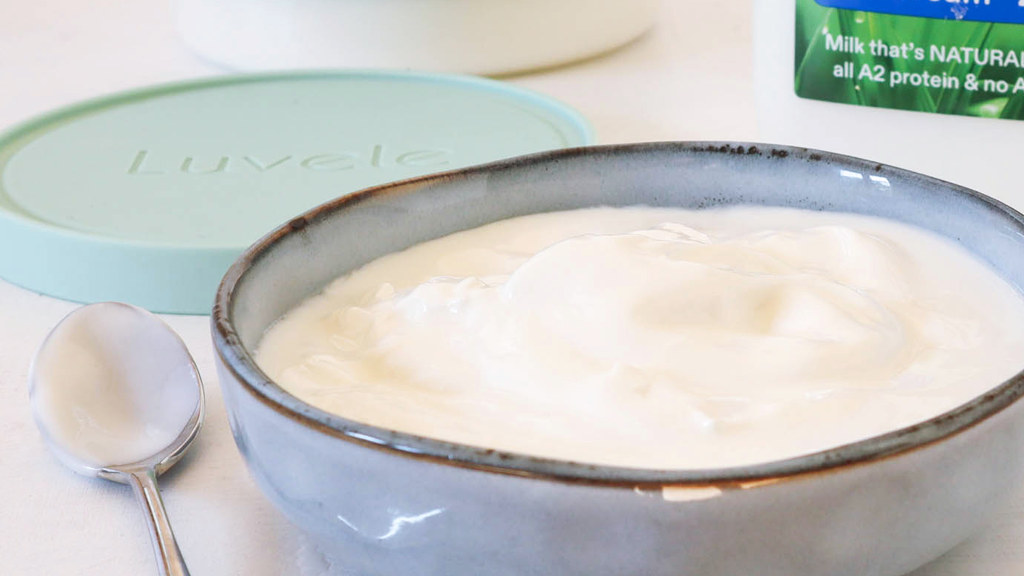Your Cart is Empty

Easy to digest homemade A2 milk yogurt recipe
Barb Hodgens
Barb Hodgens loves to cook with alternative, healthy whole food ingredients, with a focus on gut health. Barb has overcome her own gut health issues through healthy eating. Share your ideas, comments and photos at the end of this post :)

Gut friendly cow’s milk.
Not all cow’s milk was created equal. If you have trouble digesting regular cow’s milk or it makes your stomach feel a bit wrong, you might want to try A2 milk. The A2 difference is not the result of filtering, processing or genetic engineering but rather breeding. All cows’ milk naturally contains protein, but different breeds of cows produce milk with different protein structures.
Regular, store-bought cow’s milk contains a combination of A1 and A2 beta-casein, but a2 Milk contains only A2 beta-casein. Research has shown that the A2 milk protein is digested differently and may be a healthier option. This a2 milk yogurt is definitely worth a try if you struggle to digest regular milk.

We have experimented with and compared fresh a2 Milk as well as dry a2 Milk powder and love the versatility of both products. Either of the two products or a combination of fresh milk and dry powder, will reliably give you thick, spoonable yogurt and the best part – you don’t need to heat the milk first!

HEATING THE MILK IS OPTIONAL
The a2 recipe method below does not heat the milk before incubation. If you follow the Specific Carbohydrate diet (SCD) or would simply prefer to prepare your yogurt in a traditional method, please feel free to heat the milk. It is well known that heating and holding the milk between 160º-180°F (71°-82°C) produces thicker yogurt. See this cow’s milk yogurt method for instructions.
DRY MILK POWDER TIP
Adding half a cup of dry milk powder to the milk will produce thicker yogurt. Dry milk powder can be added to cold milk or heated following this method: recipe for the thickest tub set yogurt here.
Note: Use only fresh a2 Milk for SCD & GAPS.
We love to hear from you. Please tell us which yogurt making method you prefer.



Easy to digest homemade A2 milk yogurt recipe
Luvele
Rated 3.0 stars by 29 users
Not all cow’s milk was created equal. If you have trouble digesting regular cow’s milk or it makes your stomach feel a bit wrong, you might want to try A2 milk. The A2 difference is not the result of filtering, processing or genetic engineering but rather breeding. All cows’ milk naturally contains protein, but different breeds of cows produce milk with different protein structures.
Ingredients
-
2 Litres fresh, full cream a2 Milk
-
½ cup dry milk powder (optional)
-
Yogurt starter culture
Directions
Pour the milk, straight from the fridge into the yogurt making jar.
OPTIONAL STEP: stir in ½ cup of dry milk power
Add the starter culture and gently whisk it in.
Put the lid firmly on the glass yogurt jar and place into your yogurt maker. Pour water slowly into the base. The water must not be filled over the ‘tall line’ indicated on the inside wall of the maker.
Place the cover lid on top. Use the digital control panel to set the temperature to 38° C, the time to between 12 - 24 hours and then press ‘confirm’ to begin incubation. For more information on incubation times, read ‘time and temperature make all the difference to homemade yogurt’.
When fermentation is complete, remove the yogurt maker lid and gently lift out the glass jar. Straight from the yogurt maker the a2 milk yogurt will be warm and runny. Be gentle with the warm yogurt and don’t stir it or else it won’t set in a perfect white mass.
Place the tub in the fridge for at least 6 hours to chill and set.
PIN THIS RECIPE


Easy to digest homemade A2 milk yogurt recipe

Gut friendly cow’s milk.
Not all cow’s milk was created equal. If you have trouble digesting regular cow’s milk or it makes your stomach feel a bit wrong, you might want to try A2 milk. The A2 difference is not the result of filtering, processing or genetic engineering but rather breeding. All cows’ milk naturally contains protein, but different breeds of cows produce milk with different protein structures.
Regular, store-bought cow’s milk contains a combination of A1 and A2 beta-casein, but a2 Milk contains only A2 beta-casein. Research has shown that the A2 milk protein is digested differently and may be a healthier option. This a2 milk yogurt is definitely worth a try if you struggle to digest regular milk.

We have experimented with and compared fresh a2 Milk as well as dry a2 Milk powder and love the versatility of both products. Either of the two products or a combination of fresh milk and dry powder, will reliably give you thick, spoonable yogurt and the best part – you don’t need to heat the milk first!

HEATING THE MILK IS OPTIONAL
The a2 recipe method below does not heat the milk before incubation. If you follow the Specific Carbohydrate diet (SCD) or would simply prefer to prepare your yogurt in a traditional method, please feel free to heat the milk. It is well known that heating and holding the milk between 160º-180°F (71°-82°C) produces thicker yogurt. See this cow’s milk yogurt method for instructions.
DRY MILK POWDER TIP
Adding half a cup of dry milk powder to the milk will produce thicker yogurt. Dry milk powder can be added to cold milk or heated following this method: recipe for the thickest tub set yogurt here.
Note: Use only fresh a2 Milk for SCD & GAPS.
We love to hear from you. Please tell us which yogurt making method you prefer.


PIN THIS RECIPE


Subscribe
Sign up to get weekly healthy recipes & information on new product releases.
Item is added to cart


